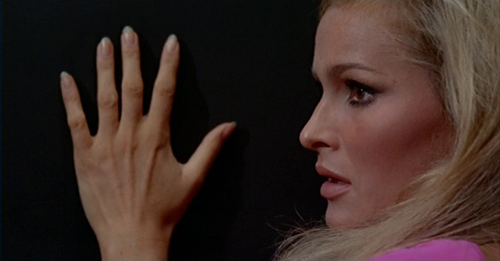By Armond White
Why are Italian filmmakers so good at political movies and Americans so bad? This week, Marco Bellocchio’s newest film Dormant Beauty has its US. Premiere at the Film Society of Lincoln Center and Elio Petri’s 1965 The Tenth Victim shows in a special screening at Film Forum–both, just in time for the Awards season to put an end to the wrangling over, Affleck’s trite Argo, Spielberg’s disingenuous Lincoln and Bigelow’s confused, evasive Zero Dark Thirty.
Bellocchio and Petri’s films are astonishing political works because they are not about issues–the downfall of Hollywood filmmakers who think they think “politically” but only in terms of issues. The Italian filmmasters think in terms of human relations. Dormant Beauty dramatizes the emotional spaces between characters with a modern euthanasia case (like the American Terry Schiavo case) in the background. Like The Tenth Victim, it satirizes how social protocol breaks down into treacherous self-survival.
The Italian ability to span dramatic and satirical political perspectives can be best understood through Bellocchio’s stratified character studies: He intercuts a politician (Tony Servillo) and his daughter (Alba Rohrwacher), a doctor (Pier Giorgio Bellocochio), a junkie (Maya Sensa), two brothers (Michele Riondino, Brenno Placido) drawn toward the medical protests, an actress-mother (Isabelle Huppert) with a comatose daughter and artistically competitive husband and son, a psychiatrist who dispenses meds to politicians and various pandering political colleagues. It’s an Altmanesque panoply where the social and the political are mixed with emphasis on the personal.
Distinctively, Bellocchio’s dramatic flair finds exuberance and sensuality in each circumstance. Dormant Beauty makes a visual feast of political opposition. Images of politicians posing for a photograph against a large-screen projection of teeming protests are captivating. This startling illusion perfectly combines conflict and opportunism–an understanding that probably derives from Neo-Realism’s grasp of individual social needs and political prospects. But it’s also uniquely Bellocchio: rich with psychological insight and operatic flair. There’ll be more to say about Dormant Beauty when a tasteful and courageous American distributor gives it the extended theatrical release it deserves.
***
“The Americans are always ahead of us” says a character in The Tenth Victim, but not speaking cinematically. It’s about a game of death where international contestants cross borders to hunt and seek each other in a tournament that anticipated The Hunger Games but designed for adults. Today our own culture has been infantilized as Argo, Lincoln, Zero Dark Thirty and The Hunger Games prove, offering meager pleasures to childish audiences who have never read Shirley Jackson’s “The Lottery.” They almost certainly have never seen Petri’s Oscar-winning political thriller Investigation of a Citizen Above Suspicion where crime and legal abuse seemed perched on the edge of modern tolerance (and contemporary temptation).
Petri’s wildly satirical political tendency asks “Why control the births when you can control the deaths?” His Pop/Op cautionary satire contains the essence of 60s audacity in cinema, fashion and politics. His heroine, American Caroline Meredith (played by Ursula Andress who brings a European Diana-the-huntress quality), is a statuesque blonde, embodying a culture hypocritical about violence and privilege. How prescient, and how daring for Film Forum to present this film during this period of post-Sandy Hook hypocrisy.
The Tenth Victim’s futurism feels only superficially dated because this remains the sexiest, funniest Orwellian film imaginable–a sociological screwball comedy starring Marcello Mastroianni and Ursula Andress as the killers-in-love. Even better it’s a satire of Antonioni’s alienation where violence has replaced the degraded sexual impulse (it becomes simply showing off on TV, in stadia or at Big Hunt Club or Club Masoch). Alienation stirs their rapport. This a richer, more erotic love story than the crude, violent shenanigans of Brangelina’s Mr & Mrs. Smith) and alienation (outside Antonioni) has never been more glamorous.
In the 60s one would go to a movie like this for its stars Marcello, Ursula and di Venanzo–the days when a cinematographer could be a star not like today’s smart-about-movies anti-aestheticism, blind to the lackluster photography of Soderberghs alter-ego Peter Andrews. The crepuscular light DiVenanzo gets when Marcello welcomes a sunset to the audience of death-seekers is stunning, unmatched until Nestor Almendros shot Days of Heaven. Like Bellocchio, Petri’s political commentary is part of his aesthetics; their social sensibility includes awareness of how we watch movies and life. This sophistication anticipates such avant-garde work as Neveldine-Taylor’s Crank movies. When it comes to political movies, the Italians are always ahead of us.
Dormant Beauty shows at the Walter Reade Theater February 20, 22, 24. The Tenth Victim will be introduced at Film Forum by Geoffrey O’Brien on February 24.
Follow Armond White on Twitter at 3xchair

